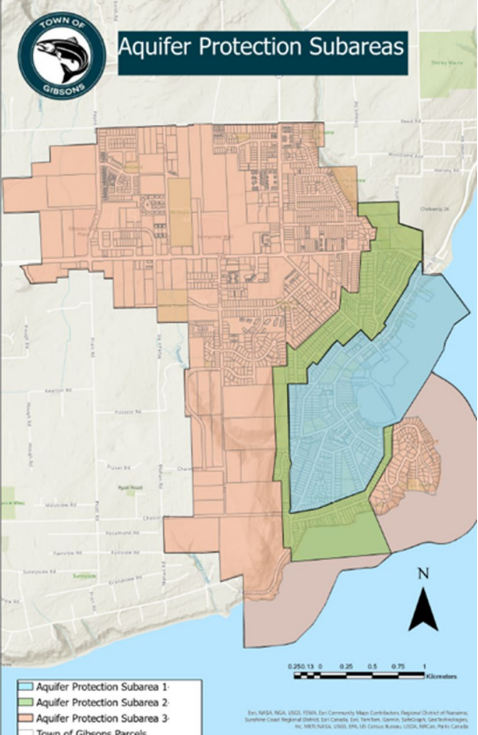Gibsons Council has approved the next step in a long-running effort to strengthen protections for the Town’s drinking water supply.
At its July 8 regular meeting, council voted to include updated language for Development Permit Area No. 9 (DPA 9) in the upcoming public engagement process for the Official Community Plan (OCP) update.
The revised language focuses on safeguarding Aquifer 560, which supplies much of the town’s water. The changes aim to streamline the permitting process while clarifying how development can proceed without compromising the aquifer’s integrity.
“This has been in the works for a while,” said Trevor Rutley, director of infrastructure services, who presented the report. “We’re now at the point where we’re ready to share it with the public.”
The updated DPA 9 narrows its objectives to focus specifically on protecting the aquifer and the low-permeability layer that shields it. Two previous objectives — related to water conservation and contamination — are now addressed through other regulations, including the Town’s Water Regulation Bylaw and the Provincial Contaminated Sites Registry.
One of the more technical changes involves how and when development permits are triggered.
Site investigations, for example, will no longer require a permit under DPA 9, as they’ll be regulated through a separate Aquifer Protection Bylaw, expected later this year.
The responsibility for reviewing permit applications will also shift from the Planning Department to Infrastructure Services.
The DPA boundary has been redrawn based on updated aquifer mapping completed in 2024.
The new map divides the area into three subareas, each with different depth thresholds for ground disturbance — ranging from 1.5 metres in the most sensitive zones to 30 metres in areas where the aquifer lies much deeper.
Council members raised questions about how “ground disturbance” is defined and whether the Town should consider regulating the weight of structures built above the aquifer.
Staff acknowledged those concerns and said further refinements may come through public feedback.
The motion to include the draft language in the OCP engagement passed unanimously.
Jordan Copp is Coast Reporter’s civic and Indigenous affairs reporter. This reporting beat is made possible by the Local Journalism Initiative.
Words missing in article? Your adblocker might be preventing hyperlinked text from appearing.



